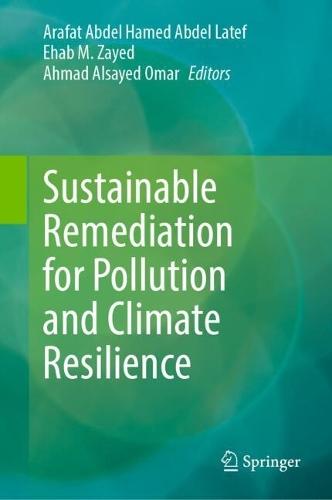Overview
This book offers a comprehensive exploration of strategies to combat pressing environmental challenges, focusing on pollution remediation and climate change mitigation. It presents innovative recycling models and advanced tertiary water treatment methods as viable solutions to these global issues. As humanity faces the consequences of pollution, from plastic waste to industrial contamination, this book highlights the need for sustainable practices that ensure environmental and biological continuity. It addresses the critical question of how to remediate plastic pollution, a major environmental crisis affecting marine life, terrestrial ecosystems, and human health. The chapters cover a wide range of topics, including the comparison of bioremediation and nanomaterials, phytoremediation of domestic wastewater, and the integration of mine rehabilitation practices in the context of climate change. Readers will discover the ecological importance of bacteria and fungi in bioremediation, the role of microbes in environmental restoration, and the potential of phycoremediation algae in mitigating climate change. The book also examines the impact of viral and fungal remediation in creating a healthy environment and the role of biofertilizers in soil remediation. This volume is essential for researchers, environmental scientists, and policymakers seeking to understand and implement effective pollution remediation strategies. It offers valuable insights into the intersection of technology and ecology, making it a must-read for anyone committed to preserving our planet for future generations.
Full Product Details
Author: Arafat Abdel Hamed Abdel Latef ,
Ehab M. Zayed ,
Ahmad Alsayed Omar
Publisher: Springer Nature Switzerland AG
Imprint: Springer Nature Switzerland AG
ISBN: 9789819656738
ISBN 10: 9819656737
Pages: 724
Publication Date: 29 May 2025
Audience:
Professional and scholarly
,
College/higher education
,
Professional & Vocational
,
Postgraduate, Research & Scholarly
Format: Hardback
Publisher's Status: Active
Availability: Manufactured on demand

We will order this item for you from a manufactured on demand supplier.
Author Information
Prof. Arafat Abdel Hamed Abdel Latef is a professor at the Department of Botany and Microbiology, Faculty of Science, South Valley University, Egypt. He has published more than 90 research articles in peer-reviewed journals and 26 book chapters in international books. He served as editor of 4 published international books. He serves as an editorial member of several reputed journals. Furthermore, he is an expert reviewer for over 150 international journals. He was one of the top 2% of scientists in the world, according to Stanford University, in 2020, 2021, 2022, 2023, and 2024. He has received several awards, such as the Egypt State Award of Excellence in Agricultural Sciences 2021, the South Valley University Award of Scientific Excellence 2019, the Top Peer Reviewer Award 2019 Powered by Web of Science and Publons, and the South Valley University Award of Scientific Publication for the years from 2010 to 2023. Dr. Ehab Mohamed Zayed is a Professor of Biotechnology for 31 years and works in the fields of genetics, agricultural genetic engineering, and biotechnology. I graduated from ZU, Department of Agricultural Genetic Engineering, in 1993. In 1998, I obtained a Master's in Genetics in the Study of Genetic Variation in Soybean Plant. Besides, I moved with many private sector companies working in biotechnology and working in the National Soybean Program. In 2007, a PhD thesis was discussed on ""Improving Soybean Plants Using Genetic Engineering Techniques"". GEBRI, MU, formerly, and SU currently. In addition to working at the scientific culture in Egypt through published and electronic newspapers. I worked as Head of the Genetic Resources Department. I was born in Egypt in 1971 and have been working at the ARC since 1994. I now have 54 research papers in different areas of crops, most of which are available on Research Gate and Google Scholar. Prof. Ahmad Omar is a professor of plant biochemistry and molecular biology at the Biochemistry Department, Faculty of Agriculture, Zagazig University, Egypt, and a Research Assistant Scientist at the University of Florida, USA. He has published over 80 peer-reviewed articles, including in Nature Communications and Frontiers in Plant Science. Dr. Omar serves as an associate editor for several journals, such as Frontiers in Plant Science, International Journal of Forestry Research, and In Vitro Cellular & Developmental Biology – Plant, and as a review editor for many others. He has received the Zagazig University Award for Scientific Publication annually from 2009 to 2023 and is an active member of the American Society for Horticultural Science and the Society for In Vitro Biology. Recently, he chaired the plant biotechnology section at the 2024 World Congress on In Vitro Biology and has been elected as the chair for the Society for In Vitro Biology’s 2026 Meeting.



